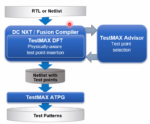Just prior to this year’s Synopsys User Group (SNUG) meeting, I had a call with Hany Elhak, Group Director of Product Management and Marketing at Synopsys, to talk about their latest announcements for analog simulation. Synopsys usually has big things to talk about each year around this time – this year is no exception. Hany… Read More
Accelerating Cache Coherence Verification
It would be nice if there were a pre-packaged set of assertions which could formally check all aspects of cache coherence in an SoC. In fact, formal checks do a very nice job for the control aspects of a coherent network. But that covers only one part of the cache coherence verification task. Dataflow checks are just as important, where… Read More
Addressing SoC Test Implementation Time and Costs
In business we all have heard the maxim, “Time is Money.” I learned this lesson early on in my semiconductor career when doing DRAM design, discovering that the packaging costs and time on the tester were actually higher than the fabrication costs. System companies like IBM were early adopters of Design For Test (DFT)… Read More
Your Car Is a Smartphone on Wheels—and It Needs Smartphone Security
Your modern car is a computer on wheels—potentially hundreds of computers on a set of wheels. Heck, even the wheels are infested with computers—what do you think prompts that little light on your dashboard to come on if your tire pressure is low? And computers don’t just run your infotainment system, backup camera, dashboard warning
Global Variation and Its Impact on Time-to-Market for Designs
We have come a long way from the days of limited and manageable characterization databases with fewer views and smaller library sizes. The technologies we are headed towards pushing characterization to its limits with special modeling for variation, aging and reliability all on a single process, voltage and temperature (PVT).… Read More
VC Formal SIG Virtually Conferences in Europe
Pratik Mahajan, Synopsys VC Formal R&D Group Director, kicked off an absorbing event featuring talks from multiple customers in Europe. He spent some time on formal signoff, an important topic that I’m still not sure is fully understood. Answering the questions “OK, we did a bunch of formal checking but how does that affect… Read More
Key Requirements for Effective SoC Verification Management
Effective and efficient functional verification is one of the biggest hurdles for today’s large and complex system-on-chip (SoC) designs. The goal is to verify as close as possible to 100% of the design’s specified functionality before committing to the long and expensive tape-out process for application-specific integrated… Read More
Techniques and Tools for Accelerating Low Power Design Simulations
I recently watched a webinar titled “How to accelerate power-aware simulation debug with Synopsys’ VC LP” that was presented by Ashwani Kumar Dwivedi senior applications engineer at Synopsys. Watching the webinar made me reminisce how design verification has evolved over the years. A long time ago, static verification started… Read More
A New ML Application, in Formal Regressions
Machine learning (ML) is a once-in-a-generation innovation that seems like it should be applicable almost everywhere. It’s certainly revolutionized automotive safety, radiology and many other domains. In our neck of the woods, SoC implementation is advancing through learning to reduce total negative slacks and better optimize… Read More
Change Management for Functional Safety
By now we’re pretty familiar with the requirements ISO 26262 places on development for automotive safety. The process, procedures and metrics you will apply to meet various automotive safety integrity levels (ASIL). You need to train organizations. In fact you should establish a safety culture across the whole company or line… Read More











